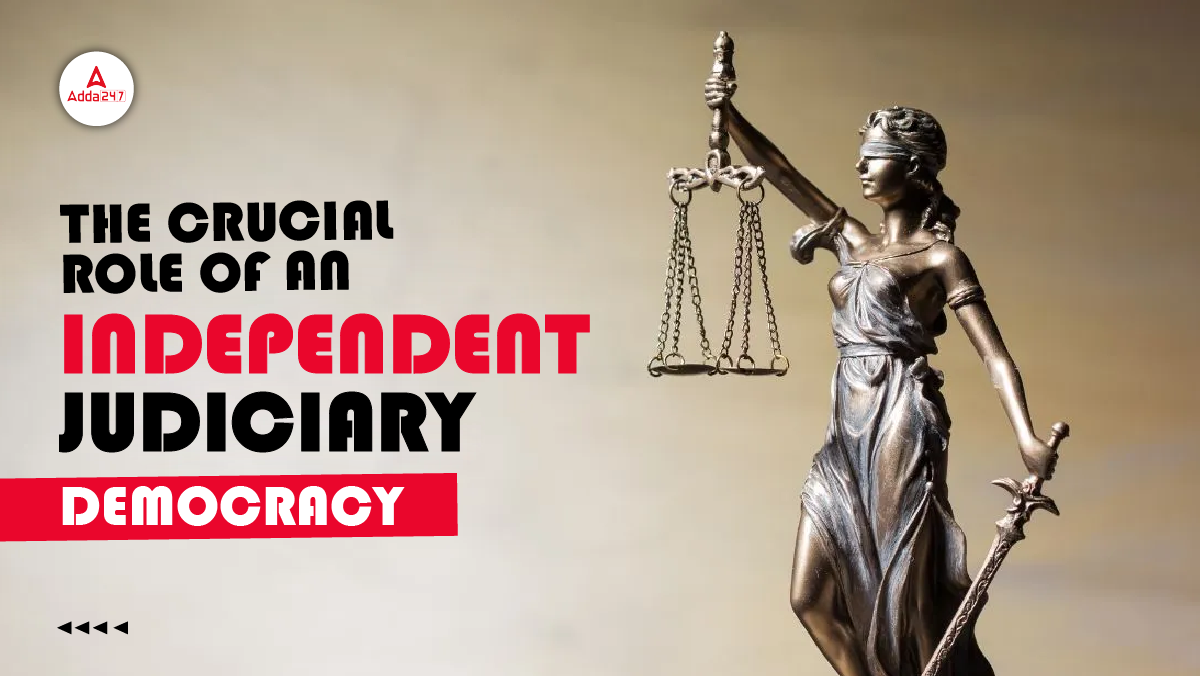Table of Contents
An independent Judiciary is essential for the functioning of any democratic Nation. It ensures that laws are upheld without prejudice or external influence, acting as the cornerstone of justice and fairness. This article delves into the concept of an independent judiciary, its historical context, international frameworks supporting it, and the significance of maintaining this independence, particularly in the Indian context.
What is an Independent Judiciary?
An independent Judiciary refers to a judicial system free from interference by the executive and legislative branches of government, as well as any external pressures or influences. The Judiciary’s independence ensures that Judges can interpret and apply the law impartially, without fear of retribution or favor. This principle is vital in upholding the rule of law and protecting the rights of individuals against abuses of power.
History of Independent Judiciary
The concept of judicial independence has evolved over centuries. The roots of this principle can be traced back to the doctrine of separation of powers, articulated by the French philosopher Montesquieu in the 18th century. However, the formal recognition of judicial independence began with the Act of Settlement 1701 in England, which established security of tenure for judges and laid the groundwork for modern judicial independence.
The Act of Settlement 1701 played a pivotal role in ensuring that Judges could operate without undue influence from the monarchy or other government branches. This Act set a precedent that was later adopted by other common law countries, including the United States and Canada, where judicial independence is enshrined in their Constitutions.
International Instruments Supporting Judicial Independence
Several international instruments emphasize the importance of an independent Judiciary. One of the most significant is the UN Basic Principles on the Independence of the Judiciary (1985), adopted by the United Nations to guide member States in ensuring that their judicial systems are free from undue influence. These principles outline the selection, appointment, and training of Judges, ensuring that they can perform their duties impartially.
Another critical document is the Bangalore Principles of Judicial Conduct (2002), which provides ethical guidelines for Judges, emphasizing values such as impartiality, integrity, and diligence. These principles serve as a global benchmark for maintaining judicial independence and ensuring that Judges uphold the highest ethical standards.
Independent Judiciary in India
India’s Constitution enshrines the principle of judicial independence. Several provisions safeguard this independence, such as the security of tenure for Judges and the protection of their salaries and allowances. Article 50 of the Indian Constitution specifically mandates the separation of the judiciary from the executive, reinforcing the independence of the judiciary.
A landmark case that highlights the importance of judicial independence in India is State of U.P. v. Raj Narain & Ors (1975), where the Allahabad High Court declared then Prime Minister Indira Gandhi guilty of electoral malpractices. This case exemplified the judiciary’s role in upholding the rule of law, even against the highest executive authority in the country.
Another significant case is the Supreme Court Advocates-on-Record Association v. Union of India (2015), where the Supreme Court struck down the National Judicial Appointments Commission (NJAC) as unconstitutional, reaffirming the independence of the judiciary in the appointment of Judges.
Challenges to Judicial Independence
Despite Constitutional safeguards, the independence of the Judiciary in India faces several challenges. These include potential biases among Judges, political interference, and issues related to the transparency of judicial appointments. For instance, the Collegium system, while designed to protect judicial independence, has been criticized for its lack of transparency.
Judicial corruption and the influence of powerful individuals or groups are other significant concerns. High-profile cases involving bribery and undue influence have undermined public confidence in the Judiciary. Moreover, threats to the personal safety of Judges, as seen in the tragic case of Additional Sessions Judge Uttam Anand in 2021, highlight the risks Judges face when delivering impartial judgments.
Conclusion
The independence of the Judiciary is the bedrock of democracy. Without it, the rule of law cannot be maintained, and the rights of individuals cannot be protected. While India has made significant strides in ensuring judicial independence, ongoing challenges must be addressed to preserve this vital institution’s integrity.



 TSPSC Group 1 Question Paper 2024, Downl...
TSPSC Group 1 Question Paper 2024, Downl...
 TSPSC Group 1 Answer key 2024 Out, Downl...
TSPSC Group 1 Answer key 2024 Out, Downl...
 UPSC Prelims 2024 Question Paper, Downlo...
UPSC Prelims 2024 Question Paper, Downlo...





